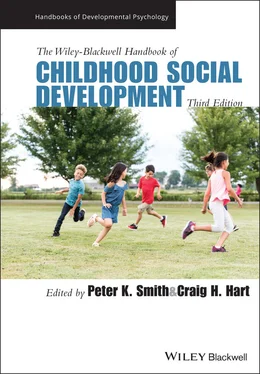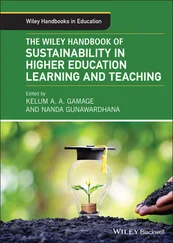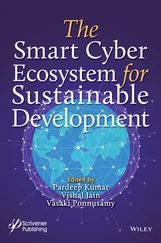to a greater or lesser extent, as passive objects, as helpless spectators in a pressing environment which affects and produces their every behaviour. They see the child as continually assimilating, learning and responding to the adult, having little autonomy, contributing nothing to social values or behaviour except the latent outpourings of earlier acquired experiences.
(Hardman, 1973, p. 87)
Building on these insights, others began to reconceptualize and rethink ideas about childhood, looking at what childhood means in contemporary societies and calling for the critical re‐examination of categories such as “the child,” “childhood,” or “children” (James & Prout, 1997). Such studies were often grouped together under the umbrella heading as the “New Social Studies of Childhood” which took as one of its main premises that childhood must be understood as a socially and culturally constructed phenomenon, which changes over time and place, and that there can be no singular concept of childhood. Anthropologists argued that both the patterns of physical and psychological development, and the meanings given to them, vary enormously within and between cultures, so that childhood should always be understood as “a matter of social definition rather than physical maturity” (La Fontaine, 1986, p. 19). This emphasis on childhood as a socially and culturally constructed category led to many criticisms, not only of studies of socialization, but also of some of the basic premises of psychology itself. Pioneers of the New Social Studies of Childhood variously accused psychologists of: being obsessed with the “normal” child and its universal, unchanging needs; being ethnocentric, and taking little account of diverse childhoods while researching almost exclusively middle‐class children in Western countries; using Western developmental patterns as the norm and downplaying the different capacities, competences, interests, and developmental trajectories of poorer and less‐privileged children both in the West and in other parts of the world; promoting a deficit model of childhood that fails to understand the complexity of children’s different competences, or appreciate individual or cultural diversity; and finally believing themselves to be part of a neutral scientific endeavor, positioning themselves above politics and claiming to generate value‐free “objective” knowledge and evidence on which policy and practice is based (see Morrow, 2011; Tatlow‐Golden & Montgomery, 2021). In their seminal book, Theorizing Childhood , James et al. memorably argued that developmental psychology belonged in the “dustbin of history” (1998, p. 9).
Another article of faith – and a reason for discarding psychological studies of development – was that children were human “beings” rather than human “becomings.” Looking at social development was problematic, it was argued, because it focused on what children would become in the future, and how they would get there, not on what children were now. In contrast, the New Social Studies of Childhood conceptualized children as highly knowledgeable and experienced experts on their own contemporary cultural worlds and denied that they were in any way incomplete, incompetent, or ignorant. It also rejected the idea that children’s social or cultural development was a linear process unfurling in measurable, universal stages, during which the incompetent and incomplete child gradually learnt social competence and developed into a fully formed adult. Competence, it was argued, was not solely an adult characteristic achieved with biological and cognitive maturity, but rather was a “fluid context‐dependent performance that can be staged by children and adults alike” (Valentine, 1997, p. 82).
Anthropologists working in this new paradigm often call their work “child‐focused” or “child‐centered” to differentiate it from previous studies of socialization or childrearing. Child‐centered anthropology conceptualizes children as active and capable people, embedded in social relationships, within particular social, cultural, and historical contexts. Instead of looking at what adults do to children and how they are socialized by others, child‐centered anthropology looks at children’s perspectives and privileges the mundane, everyday lives of children, previously dismissed as uninteresting or unilluminating. This is exemplified in the work of anthropologists like Marianne Gullestad (1984) who examined children’s daily lives at home in Norway and revealed the previously hidden importance of children’s roles and responsibilities within the family. Another example is Allison James (1993) in the United Kingdom, who explored the nature of children’s friendships in British schools. She argued that, despite their importance to children, friendships are often overlooked or trivialized by adults or interpreted only through an adult lens which looked at how children learn from peers rather than how children felt about their friendships and how they had an impact on their daily experiences.
Child‐centered anthropology is seen as a corrective to the previous marginalization of children within anthropology and an inversion of power relationships between adult and child and between researcher and researched. The term child‐centered anthropology also underlines the point that these anthropologists conduct research with rather than on children so that children are acknowledged as the experts on their own lives and experiences and serve as anthropologists’ primary informants. Children must be researched in their own terms, not talked about with parents or other adults, or their experiences extrapolated from large scale datasets. Examining childhood in this way means focusing on how children themselves perceive their lives, surroundings, parents, and upbringing – and what impact this has on wider social and cultural structures and institutions. It is based on the premise that children have agency. They are not empty vessels or blank slates who are socialized by others – but play an active part in their own upbringing, shaping and transforming themselves and others. Children themselves create meanings and form their own belief systems, negotiating and shaping social attitudes about childhood. Anne Solberg (1997), for example, looked at children’s perspectives of their daily domestic lives, as well as analyzing how children see their role in Norwegian society, and showed how this identity is arrived at through a process of negotiation between children and adults in the domestic sphere and beyond.
This emphasis on children’s voices and agency has been complemented by a more politicized theorization of the global cultural politics of childhood. This has analyzed how childhood became a conflicted and contested idea and laid bare the multiple structures and processes of power, between countries and within families (Scheper‐Hughes & Sargent, 1998; Stephens, 1995). Much of this work has pivoted on the new focus on children as rights‐bearing citizens in the international arena and the development of the United Nations Convention on the Rights of the Child (UNCRC, United Nations, 1989). The UNCRC reaffirmed the idea that children’s rights are human rights, and that while children need special protection because of their biological and social vulnerability, these rights spring from the inalienable fact of their humanity. Such ideals fitted easily with academic theorizations that children were people, that society could not be properly understood without understanding the role and experiences of every member, including children, and that children’s own perspectives and daily realities were valid and worthwhile areas of research. By valuing them in their own right children were seen by both academics and those drafting and implementing the UNCRC as individuals with rights and the potential for independent action and agency, not as appendages to their family or the passive recipients of socialization (Montgomery, 2017).
Читать дальше












